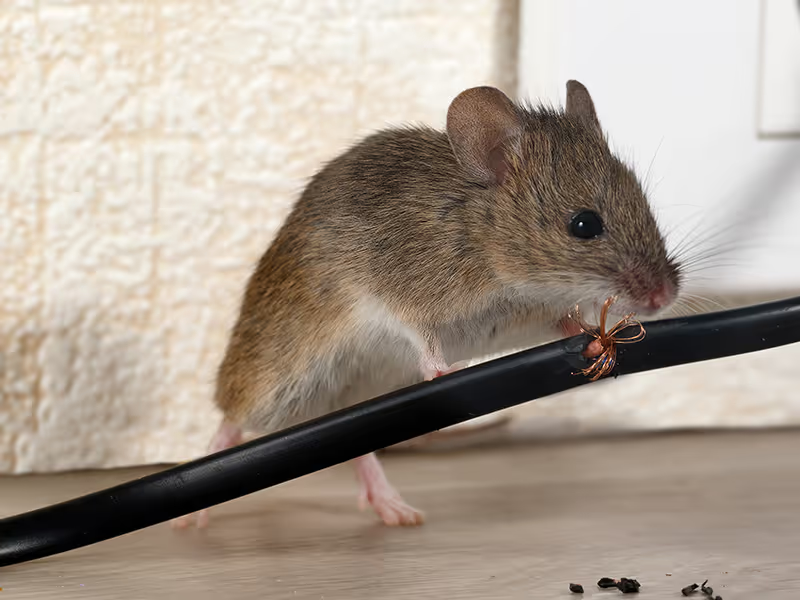Mice have a compact, slightly rounded body shape and typically measure between 5 ½ to 7 ½ inches in length from nose to tail. Their fur is usually brown or gray, and they have small, pinkish feet. Mice are easily identifiable by their rounded ears, pointed snouts, and small, beady eyes.

A female mouse reaches sexual maturity at 6 weeks of age and can produce up to 10 litters per year. Each litter typically consists of 5 to 14 pups. The gestation period is only 19 to 21 days, and a female can become pregnant again within 24 hours of giving birth.
While mice and rats share some similarities, there are several distinct differences between the two.
One noticeable difference is size: a mouse typically measures 4 ½ to 7 ½ inches long and weighs up to one ounce. In contrast, a rat can range from 9 to 11 inches long and weigh up to one pound.
Key physical features also help distinguish the two. Mice have small, delicate feet, a sharp, pointed nose, large ears relative to their body, and a slender, fur-covered tail. Rats, on the other hand, have robust, clawed feet, a broader, wedged nose, smaller ears in proportion to their body, and a thicker, hairless tail.
Mice can squeeze through openings as small as a quarter of an inch. Mice often enter homes through cracks in walls, floors, and foundations. They are skilled at locating gaps around windows, ceilings, sewer lines, sinks, and even gas lines connected to ovens.
When mice invade homes, they are typically seeking food, water, and shelter. If your home provides any of these resources, it can become an attractive target for these pests. Crumbs, pet food, and food left on counters are just a few ways food can lure mice inside. As temperatures drop and the fall breeze sets in, mice often seek warm, dry spaces to overwinter. Clutter can also attract mice, as it provides ideal nesting materials, such as cardboard, paper, and fabric.
Mice typically seek shelter in secluded, dark, and undisturbed areas. Common hiding spots include attics, wall voids, behind kitchen appliances, crawlspaces, and empty storage containers.
If your home has a mouse problem, these are some signs to look for:
While mice aren’t aggressive and don’t usually pose a direct threat to people or pets, they can still cause some serious health problems. These pests can carry and spread diseases like hantavirus, typhus, and even the plague to humans.
Pets can also be at risk, since mice can transmit things like toxoplasmosis and roundworms.
On top of that, mice can contaminate food and water with their droppings, urine, and saliva, creating an unhealthy environment in your home.
Yes, mice chew on wires and can cause a lot of trouble. They gnaw constantly to keep their teeth from getting too long, and electrical wires are often one of the things they go after. When they chew through the insulation on wires, it can lead to short circuits, power outages, or even fires in some cases. On top of being a safety hazard, this kind of damage can be expensive to fix. So even though mice seem small and harmless, they can create some big problems if they get into your home or building.
There are plenty of do-it-yourself rodent control products available, and while they might help with minor issues, they’re usually not enough to handle a full-blown infestation. The problem with DIY methods is that they often only tackle what’s visible without addressing the root of the problem. Entry points can go unnoticed or be improperly sealed, and mice often hide and nest in hard-to-reach areas that homeowners might miss. That’s why it’s usually best to call in a professional once an infestation has started. They have the tools, knowledge, and experience to find the source, seal off access points, and fully eliminate the issue to prevent it from coming back.
If you've noticed signs of mice, contact Harbor Pest Control for assistance. Our locally owned and family-operated pest control company offers effective solutions to eliminate existing mouse infestations and prevent new ones from developing. Don't wait for mice to cause serious problems; reach out today!
To prevent mice from entering your home, eliminate access to food, water, and shelter.





Helpful Tips & Info